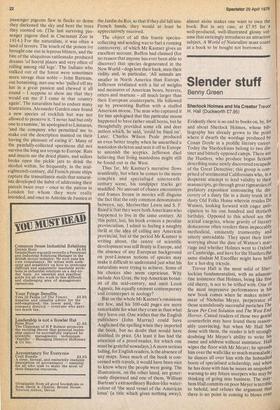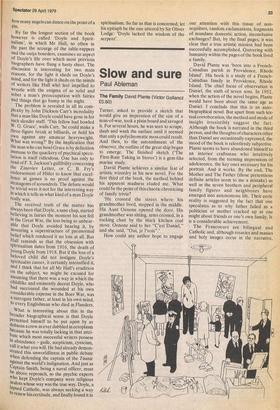Slender stuff
Benny Green
Sherlock Holmes and his Creator Trevor H. Hall (Duckworth £7.95)
Evidently there is no end to books on, by, for and about Sherlock Holmes, whose bib
liography has already grown to the point
where it dwarfs the wordage produced by Conan Doyle in a prolific literary career.
Today the Sherlockians belong to two dis
tinct and bitterly opposed camps. There are the Hustlers, who produce bogus fictions
describing some newly discovered escapade of the Great Detective; this group is comprised of sentimental Californians who, in .a desperate attempt to lend validity to their manuscripts, go through great rigmaroles of prefatory exposition announcing the discovery of a dusty file in a dusty trunk in a dusty Old Folks Home wherein resides Dr Watson, looking forward with cagcr anticipation to his one hundred and thirtieth birthday. Opposed to this school are the textual exegetes, whose gravity of literary demeanour often renders them impeccably methodical, eminently trustworthy and utterly unreadable. They spent their lives worrying about the date of Watson's marriage and whether Holmes went to Oxford or Cambridge, and have for the Hustlers the same disdain M Escoffier might have held for a hot-dog tricycle.
Trevor Hall is the most solid of Sherlockian fundamentalists, with an adamantine insistence that Holmes, being like fine old sherry, is not to be trifled with. One of the most impressive performances in his new book comes when he makes mincemeat of Nicholas Meyer, perpetrator of those scandalously successful pastiches The Seven Per Cent Solution and The West End Horror. Casual readers of those two genial counterfeits may have found them reasonably convincing, but when Mr Hall has done with them, the reader is left stronglY doubting Mr Meyer's ability to write his name and address without assistance. Hall wipes the floor with Mr Meyer; he spreads him over the walls like so much marmalade; he dances all over him with the hobnailed boots of specialised scholarship, and when he has done with him he issues an unspoken warning to any future usurpers who may be thinking of going into business. The mayhem Hall commits on poor Meyer is terrible to behold, and refutes the argument that there is no point in coming to blows over
how many angels can dance on the point of a pin.
By far the longest section of the book however is called 'Doyle and Spiritualism', in which Mr Hall, so often in the past the scourge of the table-rappers and the ouija boarders, examines an aspect of Doyle's life over which most previous biographers have flung a hasty sheet. The discussion is interesting for two main reasons, for the light it sheds on Doyle's mind, and for the light it sheds on the minds of writers like Hall who feel impelled to wrestle with the enigma of so solid and sober a man's preoccupation with fairies and things that go bump in the night.
The problem is revealed in all its complexity by John Dickson Carr's incredulity that a man like Doyle could have gone in for such slender stuff. 'This fellow had bowled W. G. Grace', wails Carr, 'he could make a three-figure break at billiards, or hold his own against any amateur heavyweight. What was wrong?' By the implication that the man who can bowl Grace is by definition immune to the quackery of psychical speculation is itself ridiculous. One has only to read of F. S. Jackson's gullibility concerning the Zinoviev Letter, or C. B. Fry's endorsement of Hitler to know that excellence at games is no proof against the • stratagems of scoundrels. The debate would be trivial were it not for the interesting way M which it tells us what kind of a man Doyle really was.
The received truth of the matter has always been that Doyle, a sane chap, started believing in fairies the moment his son fell in the Great War, the loss being so unbearable that Doyle avoided bearing it, by inventing a superstructure of paranormal belief which rendered it no loss at all. But Hall reminds us that the obsession with Spiritualism dates from 1916, the death of Young Doyle from 1918. But if the loss of a beloved child did not instigate Doyle's Spiritualist career, it certainly intensified it, and I think that for all Mr Hall's erudition on the subject, we might be excused for assuming that there was a way in which the Childlike and eminently decent Doyle, who had succoured the wounded at his own considerable expense in the Boer War, was a surrogate father, at least in his own mind, to every Englishman who died in Flanders.
What is interesting about this in the broader biographical sense is that Doyle Permitted himself to be put upon by as dubious a crew as ever dabbled in ectoplasm because he was totally lacking in that attribute which most successful writers possess Ifl abundance — guile, scepticism, cynicism, call it what you will. He had already demonstrated this unworldliness in public debate When defending the captain of the Titanic against the world's indignation. And just as Captain Smith, being a naval officer, must be above reproach, so the psychic experts Who kept Doyle's company were religious Zealots whose way was the true way. Doyle, a laPsed Catholic, was always seeking a way to renew his certitude, and finally found it in
spiritualism. So far as that is concerned, let his epitaph be the one uttered by Sir Oliver Lodge: 'Doyle lacked the wisdom of the serpent'.



































 Previous page
Previous page